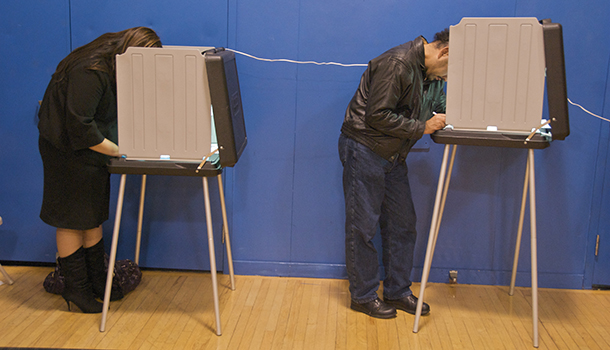
(Photo Credit: Steve Rhodes/Flickr)
The nonpartisan or “top-two” primary in California is working and the Golden State has more competitive elections, has increased voter access and a better functioning legislature.
Those are the key findings released today in a report from called A Quiet Revolution: The Early Success of California’s Top Two Nonpartisan Primary from Open Primaries. The authors of the report are Jason Olson, the president of Independentvoice.org, a San Francisco based organization of independent voters and Dr. Omar Ali, a history professor at the University of North Carolina at Greensboro and expert scholar on populist democracy movements.
In 2010, California voters passed Prop 14, which gave every voter the right to vote for any candidate in primary elections, giving politicians an incentive to appeal to all voters in their districts.
“CA Fwd enthusiastically backed Prop 14 in 2010 because it essentially forces candidates speak to all voters in their district, and not just their partisan base,'” said Lenny Mendonca, co-chair of CA Fwd. “The result of this and other reforms that have been enacted is a less partisan, more effective government. These reforms are transforming California politics for the better.
The report claims that California now has:
More Competitive Elections: From 2000-2009 only two state assembly and congressional incumbents were unseated—and, the report says, “both were under criminal investigation.” Now, the report describes California elections as the most competitive in the nation.
Increased Voter Access: A quarter of California voters are independents who previously couldn’t vote in primaries. Voters registered with a political party have more choice as they can vote for candidates from any party, not just their own. Third-party candidates and voters are no longer excluded from the first round of elections.
Functioning Legislature: The report says the “polarization in Sacramento has dissipated” and legislators who win office through bigger coalitions are capable of reaching across the aisle once elected.
Although, the report authors agree that quantifying the performance of a state legislature is, as they wrote, “a notoriously difficult task.” They do assert “that legislators who win office by building broad coalitions do the same once in office. An electoral system that incentivizes candidates to reach beyond the activist base of their own party produces similar behavior once in office.”
Critics of the top-two primary want Californians to reconsider their decision to adopt the electoral reform. They assert that, in states where a similar system is in use, it has not resulted in the election of more moderate politicians. They also point out that California still experienced a decline in voter turnout, and that Proposition 14 hurts California’s smaller, third parties and their ideas.
California, Washington and Nebraska have top two primaries. Oregon voters rejected the idea last November. Activists in Alaska, Arizona, Florida and South Dakota are working on getting nonpartisan primary measures on their respective state ballots.
CA Fwd and the Independent Voter Project will host a conversation about how California’s top-two experience is going and what the future might be for electoral reforms. The Nonpartisan Primary Summit takes place in Sacramento on August 19 (RSVP here).
Open Primaries is a national nonprofit that works to enact open and nonpartisan primary systems.

